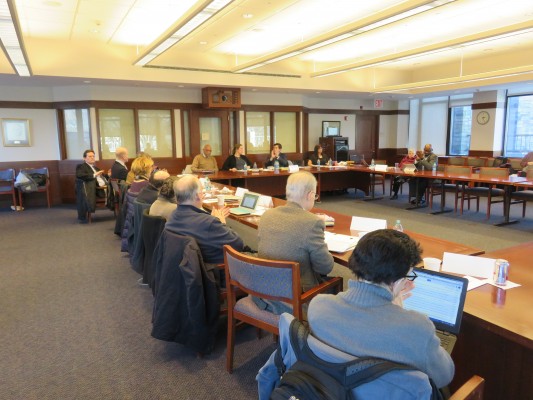Faculty Senate Discusses Diversity Task Forces
Chairperson of the President’s Task Force on Diversity and Campus Climate Peter Vaughan, Ph.D., presented information on diversity and inclusion initiatives to the Faculty Senate. (STEPHAN KOZUB/THE OBSERVER)
March 3, 2016
Following the four bias incidents that occurred on and off campus at Fordham last semester, diversity and inclusion are a focus for the Fordham10 community, including the Faculty Senate.
On Feb. 26, at the second official meeting of the Faculty Senate this semester, Peter Vaughan, Ph.D., the Chairperson of the President’s Task Force on Diversity and Campus Climate and former dean of the Graduate School of Social Service, presented information to the Faculty Senate regarding the Task Force and initiatives to address these issues at the University.
During his presentation, he discussed community meetings that will take place the week of March 7. The purpose of these meetings will be to generate discussion and input on diversity and inclusion. They will take place at the Rose Hill campus on March 8 and 9 and at the Lincoln Center campus on March 7 and 10, according to an email sent by the Office of the President on Feb. 29.
“What we hope to do in a very short period of time is to meet with constituent groups,” Vaughan said. “We’ll have four community meetings that are being planned by the three undergraduate students who are a part of the Task Force.”
Graduate students will also have their own community meeting during the same week that will be “directly focused on the needs and concerns of graduate students,” according to Vaughan.
Senators raised concerns regarding the Professional and Continuing Studies (PCS) Department and the University’s service employees not being included.
Regarding PCS students, Vaughn said, “One of [the] things we’re having is two meetings in the evening and we’re hoping to attract PCS students to those meetings.”
“We will not be meeting up at the Westchester campus, but we hope to have a hookup so that we can receive questions from those people and their comments,” he explained.
“As it relates to service personnel at Fordham, the Task Force initially desired to meet with them,” Vaughan continued. “Because of contract negotiations that are going on now, [however], we may or may not be able to meet with some groups of those people.”
The four community meetings organized by the undergraduate Task Force members, however, were originally exclusive to undergraduate students.
“It started out [that] we were going to have a town hall meeting for students, and as the Task Force developed and as we discussed more and more, we decided that it would be much more beneficial to have a community meeting where everyone could come—students as well as staff and faculty, because we want to hear from those people,” Vaughan said.
Vaughan explained that the meetings were part of the charge the Task Force received from Rev. Joseph M. McShane, S.J., president of Fordham University.
“The Task Force had its initial meeting with Father McShane, who gave us a charge, and the charge consisted of three things: study the climate of the University, review and report on the various programs that are already in place and develop recommendations to the president and the cabinet that will address the obstacles to Fordham,” Vaughan said. “Really looking at its Jesuit mission as an inclusive university.”
He further explained that reviewing the programs already in place would provide “an inventory that will help us all know where to go if we have specific or even general questions about issues affecting the University.”
Vaughan also highlighted the timeliness of the Task Force’s initiatives given that similar issues have arisen at other universities across the country.
Another part of the president’s charge to the Task Force was discussion about a diversity consultant from the University of Pittsburgh.
“[McShane] spoke about a meeting that he and his cabinet had with a consultant on diversity from the University of Pittsburgh, who really deals with issues of race and racism,” Vaughan said. “As part of the project, we’re looking at issues of race, racism and its influence on life here at Fordham.”
The Faculty Senate also discussed the minutes from the Senate’s Jan. 22 meeting, which focused on governance issues in the Gabelli School of Business. As part of this discussion, the Senate made a motion to encourage further dialogue amongst its members on issues of academic shared governance. Father McShane also met with the Faculty Senate during the meeting in executive session for approximately 30 minutes. The Senate met for approximately two hours in executive session.












